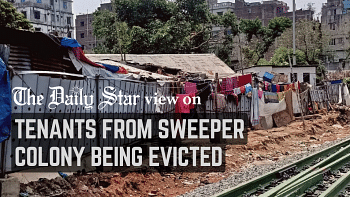Rehabilitation must come before eviction

We are outraged by the Dhaka South City Corporation's (DSCC) recent eviction of multiple families at the Miranzilla Harijan Colony in Bangshal, as reported by this daily recently. The way these vulnerable and marginalised members of our society have been made homeless, without any proper rehabilitation plans, sets a dangerous precedent that could have alarming impacts.
The sweeper colonies in the city are like ancestral homes for the Harijan community and others, who were mostly brought here during the British period. Generations grew up in these colonies, doing the same cleaning jobs for pitiable wages, which means almost none of them can save up enough to enjoy a comfortable retirement, release themselves from the grips of poverty, or leave the colonies. Therefore, the DSCC cannot just write off those no longer employed by the city as "illegal residents". Besides, how can the DSCC justify expanding a kitchen market by evicting marginalised people who have no other place to call home?
Ironically, a DSCC official has told this daily that the kitchen market expansion decision was taken in 2016; they are just implementing it now. This means that the DSCC had eight years to rehabilitate the now-evicted Harijan families but did nothing. How does this feudalistic attitude, reclaiming their land without any consideration for the gravity of the situation of the Harijans, align with the idea of a social welfare state?
While we understand that the decentralisation and development needs of the city would ultimately drive the relocation (or migration) of many families and communities, such actions should not take place in a haphazard manner. The higher authorities must come up with a long-term plan for the communities likely to be evicted as the city corporations and other agencies increasingly reclaim their land for development or commercial purposes. Meanwhile, immediate steps should be taken to rehabilitate the evicted families of the Miranzilla Harijan Colony. These communities also need special allocations under the social safety net to reduce their vulnerability from extreme poverty, job loss, or old age. The state must help them so that they do not have to live in constant fear of eviction or at the mercy of others.


 For all latest news, follow The Daily Star's Google News channel.
For all latest news, follow The Daily Star's Google News channel. 





Comments